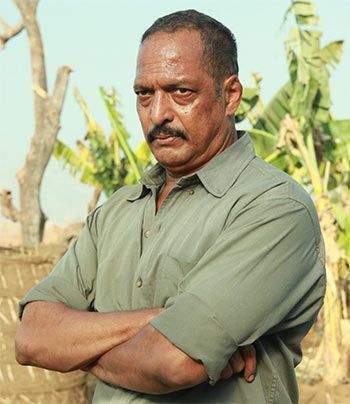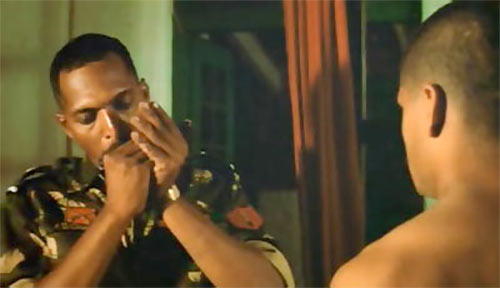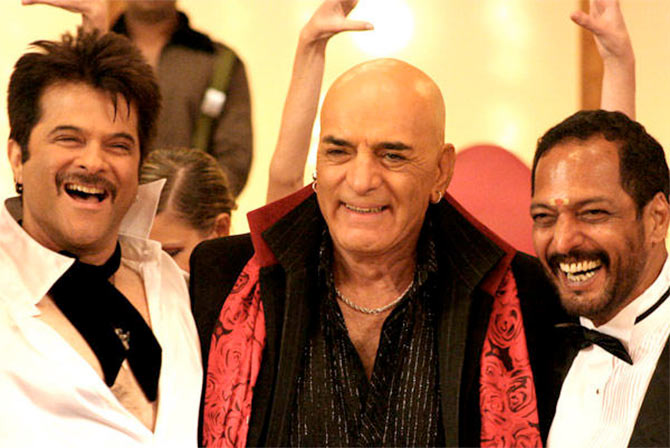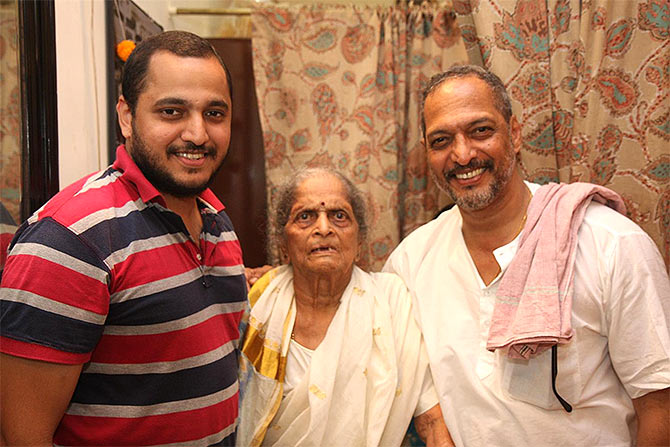 'Smita Patil was the reason I got into films. She kept telling me to get into films but I said I was happy doing theatre, I don’t like films. Today, when I look back, I don’t think I disliked films. Maybe I thought who would take me in films? I think it was a complex.'
'Smita Patil was the reason I got into films. She kept telling me to get into films but I said I was happy doing theatre, I don’t like films. Today, when I look back, I don’t think I disliked films. Maybe I thought who would take me in films? I think it was a complex.'
Nana Patekar looks back at his life.
Nana Patekar returns with a sequel to one of his best films till date, Ab Tak Chhappan.
The 64-year-old actor has been working in the film industry for 42 years, and he's still charged about the movies he's a part of.
In this interview with Patcy N/ Rediff.com, Nana Patekar goes back in time and discloses little known secrets about him.
Why make Ab Tak Chhappan 2 after 10 years?
I did not decide; the other members of the cast decided.
Shimit Amin, the director of the first film, should have directed the sequel but he was busy with other movies. I was also busy with my own projects.
Recently, everybody decided to do the sequel. I decided to hear the script, liked it, and decided to do it.
I am the only one from the old team. The cast, director and producer are new.
What did you like about the story?
It is about the personal life of Sadhu Agashe (the character he plays), his emotional ups and downs. I liked that.
Sadhu has retired, and is living with his son.
He is dejected.
Then he is called back by the department. He is reluctant to go back because he has lost his wife and he thinks he is responsible for that.
He's taking care of his son and cooks for him.
You cook in real life too.
Yes, cooking is my passion. I am a better cook than actor.
Cooking is like doing yoga. There is a lot of satisfaction in cooking food for others.

Did you learn cooking from your mother?
Yes. In the olden days, when women got their period, they had to sit in a corner of the house and could not touch anything or even cook.
When we were small, my mother would sit in the corner and instruct us what to do. That’s how I learnt. My cooking style is exactly like my mother’s.
Your father was in the textile printing business and lived in Mumbai while you lived with your mother in Murud (a town 165 km south of Mumbai).
Yes, my mother took care of us.
My mother is a very strong woman. We were seven kids, five of them passed away. My elder brother and I are alive.
My mother lost five kids, her husband, her parents and siblings. But she is so strong, she is living for the people who are alive.
She is 95 now, and is amazing.
When someone comes to visit me, she may not remember the name, but she will describe the person so well, how that person walks and talks, that I understand exactly who has come to meet me.
I have learnt acting from her. I have learnt everything from my mother.
My father loved watching theatre, cinema, tamasha (Marathi folk song and dance). He was fascinated by them. He was happy when I started working in plays. He saw only a little of my work; he didn’t get chance to see more because he passed away.
So your father was not there when you were growing up.
My father would come to meet us once a week -- it was five-and-a-half hours travel by boat and road.
We would see him in Mumbai on our vacations. In that old Bombay, there were no crowds, the roads were clean, people’s hearts were clean, they trusted and loved each other.
Nobody came out on the roads with slogans like ‘I am Maratha’ or ‘I am a Hindu’ or ‘I am a Muslim’, or ‘I am a Sikh’. People loved each other and there was bhaicharaa (brotherhood) amongst people.
I don’t like this Mumbai. I don’t like staying here, I prefer staying in villages or in Pune or Goa, but not here.
When I was in the seventh standard, I was very mischievous and was sent to my mother’s sister home in Mumbai. After a year, my aunt packed me off back to Murud because her children were getting spoilt under my influence!
Watch: When Nana Patekar bought his home in Murud-Janjira
I think those years and the mischief I did then help me today in my performance. I love writing my thoughts on anything. All those old stories are very interesting and helpful for my growth.
Impressions of your childhood remain with you all your life. Today we boast of living on the sea-face; I lived in front of the sea in Murud as a child, where I heard not lullabies but the sound of the waves, what we call in Marathi, gaaj. I slept and woke up to the sound of the waves.
We lived in a rented house belonging to Nazira Anwari and Niamaat saab, so I never knew the difference between Hindu and Muslim. My friends were their kids, Dilshaad and Saifu.
Some years later I bought a house in Murud. It is the same bungalow from where I would rob ber (Indian plums) and white jam (love apples) from the backyard as a child.
When I visited the village long after, the man to whom the house belonged was dead and I bought the house from his son.

As a child, did you have an inferiority complex because you were dark?
I always wondered how I am so black and all my brothers are good looking. I thought my parents took more care of my siblings because they were good looking.
When I was in the third standard, I took part in a village play. My father came from Mumbai to watch the play. I thought this was a good way to attract my father’s attention.
From then on, I started doing plays in school, high school and later in college.
I took part in a state competition through my drama group. Then I joined Avishkaar, a theatre group run by Sulbah and Aarvind Deshpande. I got my first award when doing a play with them. I did professional plays with Vijaya Mehta like Hamidabaichi Kothi, Mahasagar, Purush.
But it’s your performances we remember not your looks, so why the complex?
In my childhood days, a small girl, some three or four years of age, from our neighbourhood would visit us and my mother would ask her, "Neelam, who would you marry, Dilip (my brother) or Nana?'
She would point her finger at Dilip.
"Why?" my mother would ask, and she would reply because Nana is dark.
All my mother's friends would burst out laughing. It hurt me a lot. That complex kept on increasing, I guess.
The insults meted out during our childhood are very difficult to forget. Then I started becoming a loner.

Is it true that you stopped acting in Purush because the audience would clap even when you were doing a rape scene?
Yes. When I started working in films, playgoers had a certain image of me in their minds.
I played a negative character in Purush. But they looked on me as a film actor, so as soon as I came on, they would clap.
Before the play started, I would come on stage and explain that the role I was to perform was about the bad things that exist in our society, and so please don’t clap.
But when it still went on, I stopped appearing in the play. Nevertheless, I did that play for 16 years.
Did Nilu Phule do the play before you?
No. Nilu Phule did Sakaram Binder. Later I was asked to do Sakaram Binder, and I even did rehearsals for it. But it is difficult to match the impression left by someone else. Nilu-bhau was a great performer.
Even today, if someone asks me to do Sakaram Binder, I may feel like doing it, but I think I would only do it as a film.
It’s a very good play, something different.

Is it true your father was duped and lost his business?
Yes, his signature was taken fraudulently and everything was gone. I was in the ninth standard and had to start working.
I am grateful to the late G S Tari who provided me my bread and butter (Nana printed cinema posters for him). I used to call his wife Aai (mother).
You meet some good people along the journey and must not forget them.
I was paid Rs 35 a month and one meal a day. I had to walk eight kilometres to the work place -- from Matunga west to Chunabhatti (in central Mumbai)
My wishes and dreams are very small -- two meals a day for which I hope I don’t have to beg. Live life with honesty, that’s all I want. I never asked anything else from God.
Watch: Nana Patekar on his first salary
I studied at the Bandra School of Arts, which is now Raheja School of Arts. Then I went to JJ School of Arts. In the afternoons, I worked.
Later I worked for an ad agency, Strusa Advertising, as a commercial artist and visualiser. There came a time when I had to decide between a regular job and theatre. So I quit the job.
I thought I don’t have to marry, so let’s do theatre. Whenever I earn some money and a girl agrees to marry me, then I shall see.
I got married to Nilu (Neelkanti), whom I met because of my plays. She was a very good actress and also writes well. She was an officer in a bank and earned Rs 2,500 a month when I earned Rs 50 per show, when I was doing Hamidabaichi Kothi.
If I did 15 shows, I earned Rs 750. So the total was about Rs 3,250, which was more than enough.
During the mid-70s, you got a month’s rations fro Rs 200. We saved a lot of money.
We spent Rs 750 on our wedding. We had some Rs 24 left over so we bought some Goldspots (the soft drink) and gave it to our guests who had gathered.
We went to Pune for a night. Arvind Deshpande had booked a room for us in a hotel.

Why did Neelkanti not pursue acting?
Her only film was Atma Vishwas, directed by Sachin Pilgaonkar and she got an award for Best Actress. Then she didn’t do anything.
In the film which I am going to do next, Natsamrat, she could have done the role of Kaveri. But after a certain age, one tends to put on weight.
I tell her, see, we should treat our body like a weapon. Keep it fit always. You can put on weight in a jiffy, but you have to work very hard to lose it.
How did you get into films?
Smita Patil was the reason. My first film, Gaman, was with her.
She kept telling me to get into films but I said I was happy doing theatre, I don’t like films.
Today, when I look back, I don’t think I disliked films, but maybe I thought who would take me in films? I think it was a complex.
When did you get the confidence to work in films?
There was no question of films. Once I started doing theatre, there was no looking anywhere else.
In films, you give a three-second shot and people say, "Wah Dada, kya shot diya hain!" (what a shot, brother!). People praise you unnecessarily.
In theatre, you are acting for more than one-and-a-half hours, continuously, so there was no difficulty adjusting into films.
Working with the likes of Arvind Deshpande and Sulbha Deshpande in theatre helped me a lot. Vijaya Mehta was an institution in herself.

During the shooting of Parinda, there was a mishap, wasn’t there?
Yes, while shooting for the climax shot, I was burnt in a fire. I couldn't work for almost a year.
I was on the swing and they had poured rubber solution around the swing which had to burn in the scene. By mistake, too much solution was poured and the fire was huge and I caught fire.
I couldn’t convey this to the crew and they couldn't reach me and I got burnt.
A year later, we re-did that scene. The smell of the rubber solution had stuck in my mind. I told them not to use it, but they did.
I had a fight with Vinod (director Vidhu Vinod Chopra), and it got into a fist-fight.
How many times have you got into fights?
Many times. I know I shouldn't get into fights, I should control myself. But I have had fights during the making of almost all my films.
It is mentioned in the contract that I should have a fight at least once! (laughs).
It's not always for me. Sometimes, I fight for others too.
I hear that you interfere in the director’s work…
Yes, I do. Not just the director, even the writer’s work and my co-artist too. It is an old habit.
I have forced people once in a while, even my co-stars, to do what I want them to do.
But I get to learn from my co-stars too, and there is no age limit to learning.

You trained with the Indian Army during the making of Prahaar. Tell us something about that.
I trained with the Indian Army for almost three years. In the process, I wrote the script.
Why did you want to direct, and why did you not continue with it?
I wanted to save money and buy a house in Bombay. I bought the house for Rs 1.10 lakh. Today it is worth above Rs 3 to 3.5 crore.
If I had stuck to direction, it would have taken me two to two-and- a-half years to make the money.
If I am acting, I spend some 40-50 days, earn some money and move on to the next project.
How much did you earn for your films when you started out?
For Ankush I got Rs 3,000 during the shooting. For the entire movie I got Rs 10,000.
Midway the money ran out. N Chandra, the director of the film, was a good friend of mine. I mortgaged my house and gave him Rs 2 lakh. He returned the amount within two months and also gifted me a scooter.

You are doing a lot of sequels now?
Yes, I did a sequel to Welcome, and now Ab Tak Chappan. There may be a sequelto Taxi No 9211.
The other day I met Sippysaab (Rohan Sippy) and he suggested that we make a sequel to Bluff Master.
You started doing comedy with Bluffmaster.
One should do comedy with a straight face. I should give credit to Rohan Sippy and Anees Bazmee (the director of his other comic role in Welcome) who perceived the idea. They had confidence in me that I can do comedy.
On the sets you create a very informal atmosphere and even start cooking…
If we cook and have fun together, people forget their tension and they work properly.
I worked with Anil Kapoor in Parinda, which released in 1990. I have known him for 25 years now. We did Welcome in 2007.
But it was while shooting for Welcome Back that our relationship changed. we have become close friends. We were very reserved then and have opened up now.

Anil Kapoor and you took great care of the late Feroz Khan when shooting for Welcome…
No, that is not true. In fact, he took care of us and pampered us.
He would take me out for dinner often. I think he knew what his illness was (he suffered from cancer) but yet he never let anyone know.
He was a very nice human being. We missed him when shooting for the sequel Welcome Back.
Naseer (Naseeruddin Shah) has replaced him. Naseer is a good friend and we have done theatre together.
You are 64 years old. How do you keep so fit?
I work out everyday.
If you talk for eight hours giving interviews you get tired, you don’t get sleep because you were sitting the whole day, so you get up late in the morning. But whatever happens, I don’t leave home without working out.
I do cardio one day and weights the next. I do heavy workouts -- at least two or two-and-a-half hours.
I control my food too. I never eat rice or sweets. I don’t eat anything fried. I mostly make fish Konkan or Goa style, and I limit my intake.
Once your body becomes huge, you look ugly.
You have started a production company.
Yes, we have just started it. In my first film Natsamrat, I am 35 per cent producer.
You can make films that you like. I don’t have to work for money now so I can make films that I like.
I think like the audience, not like a producer or actor. The film should be different. The audience should relate to it.
I have been working for 42 years, so I have done whatever I could.
But I must say, these days there are some good scripts coming up. Youngsters today are thinking fresh and trying to say things in a new style. I like working with them.

What is your son Malhaar doing?
Malhaar has learnt cinematography and direction in New York. He doesn’t have any interest in acting.
I always tell him that his body should be in control. He is huge, he is fond of food. I should not feed him for a few days! He doesn’t take care of himself.
We look alike. He can easily play my younger self in films that require it. That is why I tell him to be fit.
Watch: Nana Patekar on his son Malhaar
Do you like going to cinema halls and watching movies?
I never go to the theatre to watch a movie. I don’t watch my films either.
If I get time, I watch some old movie on TV. I haven't watched any Hindi or Marathi movie recently.
Are you thinking of directing movies?
I am directing one, but only after I finish working in these two films that I have in hand, Natsamrat and Pratibhimb.
In Pratibhimb, there are only two characters, Mahi Gill and me. Director Sudhanshu Jha has thought of something different.
You are very open about your relationships. You once said that your relationship with Neelkanti has drifted apart.
Not drifted apart, actually. I get tired of quarrels. If I can't give happiness, I should not give you trouble. That's what I believe in.
Wherever I am troubled, I get out of there. We are not divorced. We meet almost everyday and take care of each other. But we don't live together.

And your relationship with Manisha Koirala?
I don't want to talk about relationships.
Let's not talk about the past. She must be happy somewhere.
What do you do when you are not acting?
I write, I go to the farm, I do rifle shooting. I do whatever I like.
I go for treks. I love travelling.
My farm is near the Sinhagad valley. When I start living there, I will climb up and down Sinhagad (fort) at least thrice a week.
The only problem is, my body is getting old, and body parts are not available in the market (laughs).
The advantage is I haven't put on weight so it doesn’t put a lot of pressure on my knees.
I have a house in Murud, Goa, Pune, Mumbai and also in the khet (farm). So I keep travelling and stay in Pune for a couple of weeks, then Goa and some days in Mumbai too.
I come to Mumbai only for work and my mother.
My mother can't move around with me to all these places. Her eyesight is poor and here she knows the place well, so she counts the steps when walking.
Life is good. I am happy. I have no regrets about anything.
Videos: Hitesh Harisinghani










